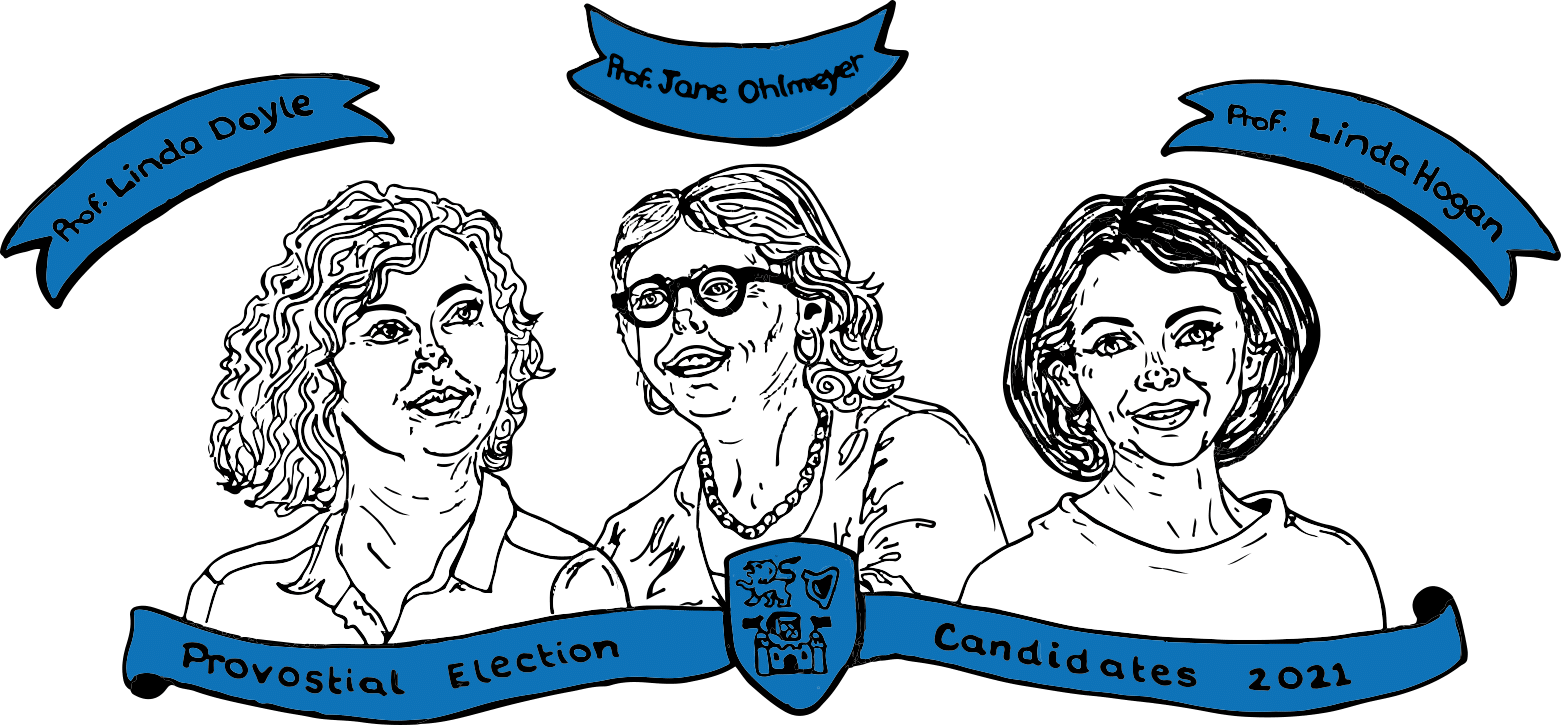Ahead of the upcoming elections, the three provost candidates, Linda Hogan, Linda Doyle, and Jane Ohlmeyer sat down for interviews with Trinity News.
All candidates have previously expressed concern over the lack of autonomy given to the Heads of Schools and Departments in how to spend their allocated funds. They acknowledged that all schools and departments are able to support themselves based on the funds they draw in. During the AHSS forum there was a general consensus that this would need to be increased, with Hogan planning to allow schools to have control over 70% of the income they generate. However, Doyle was the only candidate to stress this point in her interview.
The need for reform to the administrative system currently in place is also broadly agreed, with a dramatic reduction in the administrative load placed upon academic staff being proposed by the candidates. Ohlmeyer proposed that promotions and permanent administrative positions be introduced where possible to allow for staff to feel valued. Where systematic change was also seen as necessary by candidates, Hogan and Doyle both previously proposed increasing the training available to Academic Registry staff during the Health Sciences forum.
In relation to funding, all candidates agree that they will need to lobby for an increase in funding from the government, along with philanthropy. Trinity, which has been underfunded by the Irish government since the recession, will need in excess of an additional €50 million annually according to Ohlmeyer, in order to fully fund current places, along with the new places added under Covid-19. Ohlmeyer also expressed a willingness for further commercialisation, but stressed the need to strike a balance between tourism and students.
Funding will be very important in the post-Covid landscape. Trinity is projected to lose €40 million over the course of two years and it is not unlikely that the Irish government will introduce further cuts to tertiary education to alleviate the national economic burden. Though as Chair of the Irish Research Council, Ohlmeyer may be particularly well suited to the job of obtaining funding, her funding projection is optimistic.
Both Ohlmeyer and Hogan listed one of their top priorities as reducing the staff to student ratio to 12:1 or 14:1 and 16:1 respectively. While Hogan does believe that it is important to lower the student to staff ratio so as to get a better distribution of work between academic staff, she questions the achievability of Ohlmeyer’s target.
Ohlmeyer sees getting down to these numbers as a critical step in reaching her goal of getting back into the top 50 of the world rankings. She stressed Trinity getting into the top 100 of the world rankings as essential to securing funding and attracting investment. In contrast Hogan’s ambitions to get into the top 50 of the world rankings were framed not as a goal, but as a consequence of her reforms. Doyle has not set any specific objectives regarding world rankings, and asserts that College’s behaviour should drive the rankings, instead of rankings driving College’s behaviour.
During Hogan’s interview, she expresses her goal of creating a more diverse, inclusive Trinity, while Hogan relays her intent to create a more fair Trinity through hiring an interpreter and learning from students on issues such as sexual harassment. She hopes that this Citizen’s Assembly style system will allow for the University to tackle these issues. Ohlmeyer has proposed a campaign against bullying, in which a zero tolerance policy is established against sexual harassment, misogyny, and extremism. She reasons this by stating that “Bullying… threatens academic freedom.”
Regarding the future of online learning, all three candidates were in agreement that it would not, and could not replace face-to-face learning post Covid-19. They did however, have different views on its future role. While Hogan asserted that the role of online learning should be determined by individual lecturers, Doyle believed it could be used as an enhancement of in person learning, however, to what extent could be decided upon through a Citizen’s Assembly with both students and experts giving their opinions. Ohlmeyer on the other hand believes that online learning could play a more significant role in the future of smaller academic disciplines, where individuals from around the world could take classes, in order to increase student numbers. However, previous to these interviews, all candidates agreed that for online learning to continue, there would need to be proper investment and systems set up to support it.
Ohlmeyer has promised that she will treat the climate crisis with the same urgency as Covid-19, with sustainability at the forefront of every decision being made. She praised students for taking the initiative on the issue, with the Trinity College Students’ Union (TCDSU) launching a petition on the issue in January. Hogan promised to reach carbon neutrality by the end of her tenure should she be elected. Doyle has plans to establish a sustainability office in her manifesto. All three candidates have expressed a willingness to continue the sustainability initiatives of the current provost, Dr Patrick Prendergast.
The provost election is set to take place on April 10, and will be historic no matter which candidate is elected as they will be Trinity’s first female provost.






